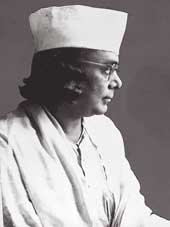Tribhuboner Priyo Muhammad: Difference between revisions
Wiki N Islam (talk | contribs) ←Created page with '{{Infobox song | name = Tribhubaner Priya Muhammad | cover = Kazi Nazrul Islam, circa 1940.jpg | caption = Kazi Nazrul Islam | alt = | type = Nasheed | artist = Abbasuddin Ahmed | album = | EP = | written = Kazi Nazrul Islam | published = 1935 | released = 1935 | format = | recorded =1935 | studio = | venue = | genre = Nazrul Geeti, Ghazal | length = | label = | writer = Kazi Nazrul Islam | composer = Kazi Nazrul Islam | lyricist = K...' Tags: Mobile edit Mobile web edit |
(No difference)
|
Revision as of 14:06, 23 October 2023
| "Tribhubaner Priya Muhammad" | |
|---|---|
 | |
| Nasheed by Abbasuddin Ahmed | |
| Written | Kazi Nazrul Islam |
| Published | 1935 |
| Released | 1935 |
| Recorded | 1935 |
| Genre | Nazrul Geeti, Ghazal |
| Songwriter(s) | Kazi Nazrul Islam |
| Composer(s) | Kazi Nazrul Islam |
| Lyricist(s) | Kazi Nazrul Islam |
| Music video | |
| "Tribhubaner Priya Muhammad" by Kalarab on YouTube | |
"Tribhubaner Priya Muhammad"[1][2] (Bengali: ত্রিভুবনের প্রিয় মুহাম্মদ, lit. 'Muhammad, the beloved of tri-dimension') is a nasheed or ghazal composed by the Kazi Nazrul Islam, celebrating the birth of the Prophet Muhammad. The ghazal was composed in 1935, in the melody of "Kâtibim", a traditional Turkish folk music.[3][4] Nazrul's first song in the melody of Kâtibim was "Shukno Patar Nupur Paye", which was recorded by Harimati Devi in 1933. Two years later, in 1935, Tribhuvaner Priya Muhammad, in the same melody came out, featuring the voice of Nazrul's disciple and connoisseur Abbasuddin Ahmed.[4]
Background
The melody of Tribhubaner Priya Muhammad was considered to be inspired from Arabic folk music once. According to the researcher Asadul Haque in his article titled "Successful application of Arabic melody in Bengali songs by composer Nazrul" ({{lang|bn|সঙ্গীতজ্ঞ নজরুলের বাংলা গানে আরবি সুরের সুষ্ঠু প্রয়োগ} in published Dainik Ittefaq, he heard the same melody of a Turkish song while staying at Ankara, Turkey In 1965.[4] He became doubted about the claimed Arabic origin of that melody and went out for research.[4] When he went to Syria in an official trip, he asked a local old person who replied that it was "a thousand-year-old melody" of the Syrian song "Ya Banat Iskandaria" (Arabic: يا بنات اسكندريّة) meaning "Oh Girls of Alexandria",[5] the Turkish version of which is known as 'Kâtibim'. The song is about a girl and her clerk while visiting Üsküdar.[4]
No clear reference exists about source where Nazrul got the melody of this nasheed or from whom he learned it. Some researchers believe that Nazrul got the melody of Kâtibim from the soldiers of the Bengal Regiment, who were sent to Iraq for training against the German forces in 1914 at the beginning of the World War I.[6]
Lyrics
ত্রিভুবনের প্রিয় মুহাম্মদ এলো রে দুনিয়ায়।
আয় রে সাগর আকাশ বাতাস দেখবি যদি আয়।।
ধূলির ধরা বেহেশতে আজ, জয় করিল দিলো রে লাজ।
আজকে খুশির ঢল নেমেছে ধূসর সাহারায়।।
দেখ আমিনা মায়ের কোলে, দোলে শিশু ইসলাম দোলে।
কচি মুখে শাহাদাতের বাণী সে শোনায়।।
আজকে যত পাপী ও তাপী, সব গুনাহের পেল মাফী।
দুনিয়া হতে বে-ইনসাফী জুলুম নিল বিদায়।।
নিখিল দরুদ পড়ে লয়ে নাম, সাল্লাল্লাহু আলায়হি ওয়া সাল্লাম।
জীন পরী ফেরেশতা সালাম জানায় নবীর পায়।।
Muhammad, the beloved of three demensions, came to the world
Come the sea, the sky, the wind, if you want to see.
Dusted earth in heaven today, won and gave shyness
Today the rain of happiness has fallen in the adust Sahara.
Look in the Mother Amina's arms, baby swings Islam swings
Recites the words of testimony in the vealy mouth.
All sinners and penitents today, got pardon of all sins
Unjust oppression left from the world.
All praises recites the name, may God bless him and grant him peace
The Jinns angels greet the Prophet on his feet.
Reference
- ^ banglaislamigaan (2011-02-27), Tri-vuboner prio Muhammad. naat-e-rasul nat islami gajal nazrul songit bangla islami gaan, retrieved 2016-09-22
- ^ Priyo Muhammad, Tri Vuboner (August 24, 2022). "Tri Vuboner Priyo Muhammad". Sur Onuragi. SurOnuragi. Retrieved August 24, 2022.
Tri-vuboner priyo Muhammad
- ^ Deshkal, Shampratik. [Background of Nazrul's creation of Islamic music]. Shampratik Deshkal (in Bengali) https://shampratikdeshkal.com/print/200517328. Retrieved 2022-07-12.
{{cite web}}:|trans-title=requires|title=or|script-title=(help);|url=missing title (help); Unknown parameter|tite=ignored (|title=suggested) (help) - ^ a b c d e "নজরুলের গান, ত্রিভুবনের সুর" [Nazrul's song, the melody of three dimensions]. www.anandabazar.com. Retrieved 2022-07-27.
- ^ Tesha Teshanovic (2010-05-17), Mohammed El-Bakkar - Banat Iskandaria, retrieved 2018-03-09
- ^ "কবি নজরুলের সৈনিক জীবন" [Soldier life of Poet Nazrul]. Chandpur Times (in Bengali). Retrieved 2022-07-12.
